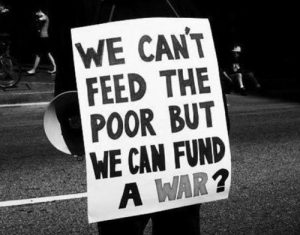(ThyBlackMan.com) Obscured by the torrent of other news flooding the airwaves over this past week – i.e. the Cohen raid, the Comey book and the Syria strike – was mention of an Executive Order issued by the White House. The order, Reducing Poverty in America by Promoting Opportunity and Economic Mobility, begins with a statement of purpose saying:
“The United States and its Constitution were founded on the principles of freedom and equal opportunity for all. To ensure that all Americans would be able to realize the benefits of these principles, especially during hard times, the government established programs to help families with basic unmet needs. Unfortunately, many of the programs designed to help families have instead delayed economic independence, perpetuated poverty, and weakened family bonds. While bipartisan welfare reform enacted in 1996 was a step toward eliminating the economic stagnation and social harm that can result from long-term Government dependence, the welfare system still traps many recipients, especially children, in poverty and is in need of further reform and modernization in order to increase self-sufficiency, well-being and economic mobility.”
While I, at times, have wrestled with the question of when does a “safety net” program become a “spider’s web”, ensnaring its intended beneficiaries, I have sincere doubts that this “reform” effort is truly meant to uplift poor people, and especially people of color. The actions of this administration to date have been antithetical to the needs and aspirations of anyone but the rich and powerful and the general mood of the country seems much more aligned with an attitude of “us versus them” than the biblical injunction to care for the poor, sick and needy. The president posits every human interaction as a zero-sum proposition, somebody wins and somebody loses, and I think this announcement directing the Departments of Treasury, Agriculture, Labor, Health and Human Services, Housing and Urban Development, Transportation and Education to “review all regulations and guidance documents… relating to waivers, exemptions, or exceptions for public assistance program eligibility requirements…” for “any public assistance programs… that do not currently require work…” will, in the end, be more punitive than rehabilitative.
relating to waivers, exemptions, or exceptions for public assistance program eligibility requirements…” for “any public assistance programs… that do not currently require work…” will, in the end, be more punitive than rehabilitative.
First, the word “reform” in Washington-speak has become a euphemism for “cut” and ultimately I believe that is the intended purpose here. No sooner than Congress had passed budget busting tax “reform” (cuts) and increases in military and domestic spending, House Speaker Paul Ryan again began talking about the urgent need for “entitlement reform.” It doesn’t take an economic genius to figure out that if you increase spending and decrease revenue, especially when you’re already in the hole, big deficits lie ahead. And the usual legislative strategy has been to “balance the budget on the backs of the poor.”
Many States have already begun to “reform” their safety net programs by imposing work requirements for food stamps and Medicaid, and are discussing work requirements for housing assistance. The odd result, however, is that these measures tend to increase spending on the bureaucracy. Take Kentucky for example, the state plans to spend an extra $347 million over the next two years to implement its new work requirements for Medicaid – someone has to monitor, report and sanction beneficiaries who are not in compliance – so, unless the state reduces Medicaid benefits, overall program spending will increase.
Second, we know that an exclusive focus on “work” is not a panacea for all societal ills. After all, we have to be mindful that Africans were brought to America on a “full employment program”: It was called slavery. Malcolm X spoke to the circular and inter-related nature of poverty when he said, “You grow up in a bad neighborhood and you go to a bad school, you go to a bad school and you get a bad education, you get a bad education and you get a bad job, you get a bad job and you wind up back in a bad neighborhood.” Without addressing the other contributing factors, the problem of generational poverty will remain.
It’s also notable that the Department of Justice is not one of the agencies that has been directed to see how its policies impact poverty. Although including “formerly incarcerated individuals” in the Executive Order as people “that may particularly struggle to find and maintain employment”, this administration is reversing the trend against using mass incarceration as part of its criminal justice strategy. A criminal record, especially for people of color, closes the door on education and employment opportunities to the point that recidivism is the most likely result. Recommendations for reforms are due to the Office of Management and Budget in 90 days.
Lyndon Johnson, with his “Great Society”, launched the War on Poverty in the 1960s. With this Executive Order issued on April 10, 2018, Donald Trump, with his “Principles of Economic Mobility”, officially declared a War on the Poor.
Staff Writer; Harry D. Sewell

















Leave a Reply